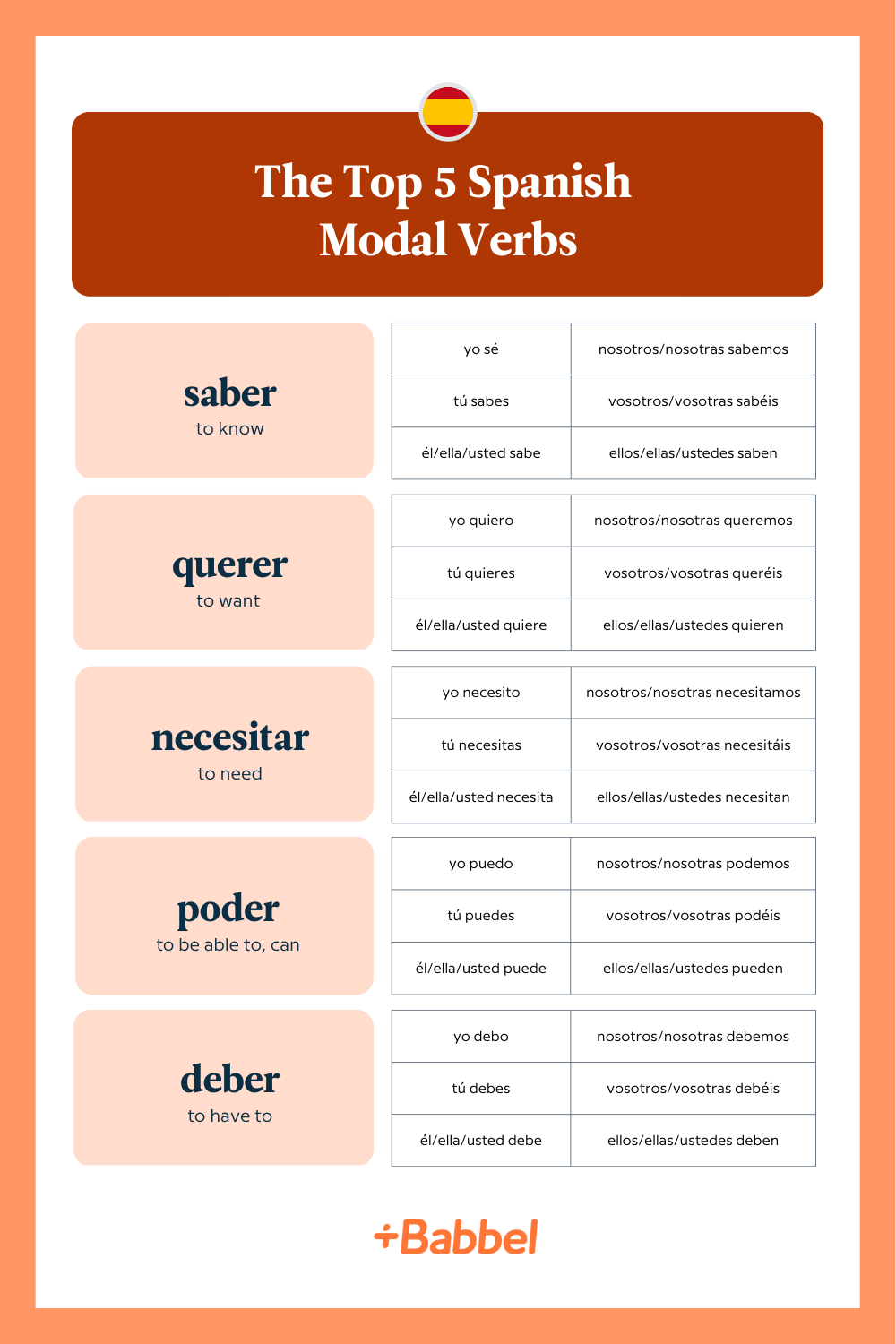Verbs are usually associated with action. They’re the words that tell you what exactly happened or is happening. You go, he walks, they ruminate and so on. But not every verb is like that. There’s a whole class of auxiliary verbs that instead express possibility, desire, obligation or some other, more ephemeral concepts. These are the Spanish modal verbs, and they’re very important to know.
Modal verbs are used all the time in Spanish because they express the speaker’s attitude in relation to an action. For example, if we say Nosotros queremos hablar español (“We want to speak Spanish”), we’re saying that we have the desire to speak Spanish. This attitude is known as modality. In addition, all the modal verbs are followed by another verb in the infinitive: debemos practicar (“we have to practice”), sabes cocinar (“you know how to cook”) and so on.
Below you can see the conjugations for the 10 most common Spanish modal verbs, what their modality means and example sentences in songs from the Spanish-speaking world. We recommend that you listen to the songs and pay attention to how the modal verbs are used and pronounced so that you can practice them afterward. And before that, we also have a useful infographic on the top five Spanish modal verbs.

10 Spanish Modal Verbs And How To Use Them
1. saber — knowledge or ability
| yo sé | nosotros/nosotras sabemos |
| tú sabes | vosotros/vosotras sabéis |
| él/ella/usted sabe | ellos/ellas/ustedes saben |
Example: Tú no sabes qué tanto yo te quiero a mi lado. (“You don’t know how much I want you by my side.”)
Song: Tú no sabes qué tanto — Carlos Baute, Venezuelan Latin pop
2. querer — desire
| yo quiero | nosotros/nosotras queremos |
| tú quieres | vosotros/vosotras queréis |
| él/ella/usted quiere | ellos/ellas/ustedes quieren |
Example: Eres lo que más quiero en este mundo, eso eres. (“You’re what I want the most in this world, that’s you.”)
Song: Eres — Café Tacvba, Mexican Latin rock
Good to know: the verb querer, when it’s not a Spanish modal verb, also means “to love” (romantically).
3. necesitar — necessity
| yo necesito | nosotros/nosotras necesitamos |
| tú necesitas | vosotros/vosotras necesitáis |
| él/ella/usted necesita | ellos/ellas/ustedes necesitan |
Example: Que me enseñen a volar, no necesitamos más. (“Teach me to fly, we don’t need anything else.”)
Song: No necesitamos más — Silvia & Karmen, Mexican artisanal pop
4. poder — ability, possibility or permission
| yo puedo | nosotros/nosotras podemos |
| tú puedes | vosotros/vosotras podéis |
| él/ella/usted puede | ellos/ellas/ustedes pueden |
Example: Tú no puedes comprar las nubes, tú no puedes comprar los colores. (You can’t buy clouds, you can’t buy colors.)
Song: Latinoamérica — Calle 13, Puerto Rican rap
5. deber — obligation
| yo debo | nosotros/nosotras debemos |
| tú debes | vosotros/vosotras debéis |
| él/ella/usted debe | ellos/ellas/ustedes deben |
Example: Debo partirme en dos. (“I have to split in two.”)
Song: Debo partirme en dos — Silvio Rodríguez, Cuban new troba and protest song

6. podría, debería — ability, obligation
| yo podría, debería | nosotros/nosotras podríamos, deberíamos |
| tú podrías, deberías | vosotros/vosotras pordríais, deberíais |
| él/ella/usted podría, debería | ellos/ellas/ustedes pordían, deberían |
Example: Podría ser tan fácil, sería espectacular. (“It could be so easy, it would be spectacular.”)
Song: Noches reversibles — Love of Lesbian, Spanish indie pop-rock
Good to know: podría and debería are just the conditional forms of two previously mentioned modal verbs, poder (ability) and deber (obligation).
7. tener que — obligation or necessity
| yo tengo que | nosotros/nosotras tenemos que |
| tú tienes que | vosotros/vosotras tenéis que |
| él/ella/usted tiene que | ellos/ellas/ustedes tienen que |
Example: He aprendido a sonreír cuando tengo que perder. (“I’ve learned to smile when I have to lose.”)
Song: El color de tu piel — La Guardia, Spanish country rock
8. haber que — obligation or necessity
hay que + infinitive — impersonal
Example: No hay que llorar, que la vida es un carnaval y las penas se van cantando. (“You [in general] must not cry, life is a carnival and pain sings itself away.”)
Song: La vida es un carnaval — Celia Cruz, Cuban salsa
Good to know: the verb haber has only one form in the present tense, hay, so you don’t have to conjugate it! That’s why this is the only Spanish modal verb on this list without a conjugation chart.
9. Soler — habit or repetition
| yo suelo | nosotros/nosotras solemos |
| tú sueles | vosotros/vosotras soléis |
| él/ella/usted suele | ellos/ellas/ustedes suelen |
Example: Hace un mes solía escucharte y ser tu cómplice. (“A month ago I used to listen to you and be your partner.”)
Song: Tu falta de querer — Mon Laferte, Chilean alternative pop-rock
Good to know: it’s common to use the past tense of the verb soler (solía) to talk about what happened frequently in the past, but not anymore. For example, Yo solía ver películas infantiles [pero ya no las veo]. (“I used to watch childish movies [but I don’t anymore].”)
10. acabar de — recently finished
| yo acabo de | nosotros/nosotras acabamos de |
| tú acabas de | vosotros/vosotras acabáis de |
| él/ella/usted acaba de | ellos/ellas/ustedes acaban de |
Example: ¿Qué te voy a decir si yo acabo de llegar? (“What am I going to say if I have just arrived?”)
Song: Acabo de llegar — Fito & Fitipaldis, Spanish blues/rock
What an exciting musical journey! Now you know the 10 most important Spanish modal verbs and 10 songs where they’re used. Did you pay attention to the pronunciation? And all the countries where these verbs are used? We recommend that you keep practicing. You’ll have these verbs perfected before you know it.











